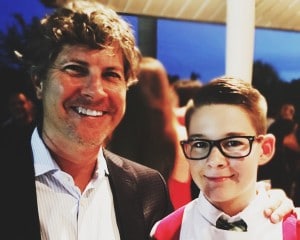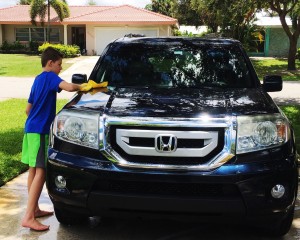
Carson’ s Carwash : A Lesson In Financial Literacy
 As the uncle of two nephews, I am always on the lookout for new things we can do together that don’t involve television or video games.
As the uncle of two nephews, I am always on the lookout for new things we can do together that don’t involve television or video games.
Back in December, when we were having one of our ‘Uncle Hank Days’, I started a conversation with Carson—who’s 14—to see if he had a job or did things around the house to earn money.
His reply: Some chores, but nothing on a regular basis.
Hmmm.
When I was growing up mowing the lawn, car washing, and general yard work were normal weekly activities for boys my age. When I turned 16, I got a summer job as a laborer on a construction site and worked at a restaurant between sports seasons during the school year. I found it easy to find part time jobs to earn extra money.
These days, the part time job seems much more difficult to come by. New rules and regulations dictate when kids (16+) can be on the road and how late they can work. Local businesses are reluctant to hire anyone under the age of 18 for fear they might violate Child Labor laws. Also, with the advent of the gated community where homeowner’s fees cover yard maintenance, the list of possible work opportunities has declined significantly.
What’s a young person to do?
I wanted to find something to do with my nephew, and teach a few financial literacy lessons at the same time. Allow me to digress to my Soapbox for a minute…
In 2008, the President’s Advisory Council on Financial Literacy defined personal financial literacy as “the ability to use knowledge and skills to manage financial resources effectively for a lifetime of financial well-being.” Personal financial literacy is more than just being able to balance a checkbook, comparison shop, or find a job. It also includes skills like long-term vision and planning for the future, combined with the discipline to use those skills every day. In the US, we make great efforts to teach children to read and write, but we don’t give their financial literacy the same attention.[1] As a result, few young people have the necessary knowledge to make basic financial decisions when the leave home for the first time.
Not my nephews; no way.
So I asked Carson if he had ever washed a car.
His reply: Maybe once or twice with my dad.
My next question: Would you be interested in learning and then starting a small car wash business?
Carson’s answer: Yes.
It was on!
Step 1: Create a business plan.
We identified potential clients and created our prospect list: Mom, Dad, Grandma, and Grandpa. Next we created an Excel spreadsheet to track the startup cost and revenue from our business, and we discussed how to use our iPhone to schedule recurring reminders to manage everything. Finally, we discussed what to charge. We settled on $15 for a full car wash with interior vacuum and wipe down.
Potential opening day revenue: 4 X $15 = $60
Step 2: Purchase supplies.
While we drove to the store to purchase Carson’s Car Wash items, I carefully explained the basics of a loan. I offered to cover Carson’s start-up costs (interest-free) and bought all the products—a sponge, high-quality brushes, chamois cloths for drying, buckets, and soap.
Total cost: $200.
On the first day of business, I was there to teach him how to wash a car. We started with the wipe down and interior vacuum, then washed the exterior, and finished up using a special cleaner for the wheels. I taught him how to pay attention to detail by cleaning the door jams, and showed him how to wipe down the windows using a product that makes the water bead when it rains.
While we worked, we discussed a strategy to incent people to have their car washed every two weeks versus once a month. We also discussed how to create a small flyer to share with neighbors. Behold the business growth plan. We settled on $15 every two weeks or $20 once a month.
Each car wash took about 1 hour to complete. At one point my nephew proclaimed that he was making more than minimum wage. Yes, our first financial lesson seemed to be a success! As a side note, there are 2,561,000 people making minimum wage or less, or 3.3% of the work force.[2]
When one of my mom’s friends heard about Carson’s Car Wash, she asked to have her car done when she came to visit. Another lesson I shared with my nephew is my belief that it’s easy to get ahead in life if you are willing to work just 20% harder that the average person. In most cases, the only limitations we have are the ones we place on ourselves.
With Carson’s new business up and running, my role as small business advisor (in addition to being The Bank of Uncle Hank) was to check in regularly to make sure he stayed on track. On my next visit, we planned a trip to the bank and auto store. We stopped to deposit some of our profits, and learned how to fill out a deposit slip (a lost and dying art) and endorse a check. Also, we had a brief discussion about interest rates (or the lack of interest rates in our case). I took the opportunity to teach another financial lesson about saving and having balance in life by keeping some cash to spend on fun things. Our last stop of the day was to purchase new cleaning supplies, and while I was willing to fund the startup, I was proud that my nephew wanted to spend his own hard-earned money to replenish his supplies.
The final lesson: you have to spend money to make money.
I believe that in order to improve the money management and life skills of your children, you have to invest more time building their financial literacy. If you can tie those lessons into a project, even better.
One book I recommend all parents have their children read is The Richest Man in Babylon, by George S. Clason. For that matter, parents should read it, too, so they can learn and have something to discuss with their kids.
As always, we welcome your comments and questions at Financial Strategies Group.
This is Hank W. Cleare, CFP®, Giving More than Just Investment Advice…
#1-525736
[1] PBS.org “Your Life, Your Money.
[2] Bureau of Labor Statistics, “Characteristics of Minimum Wage 2015 Report.”




